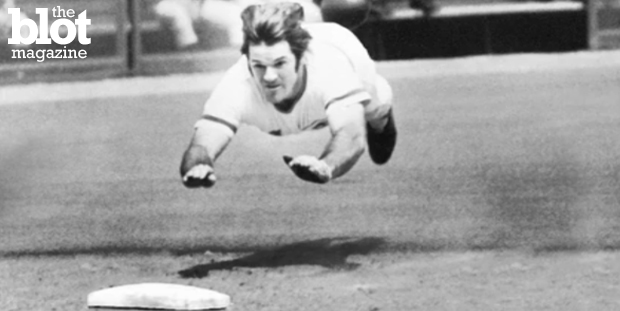
Last month, Peter “Charlie Hustle” Edward Rose formally requested to new Major League Baseball Commissioner Rob Manfred that he be reinstated. Rose was permanently banned from Major League Baseball in 1989 for betting on games while he was manager of the Cincinnati Reds. Though he played 24 MLB seasons and is one of the game’s all-time legendary players, Rose’s story has become a sad tale with, as it stands, no end in sight. But unlike his predecessor Allan “Bud” Selig who kept totally mum on the subject for 20 years, Manfred broke the long silence on the ban saying Rose’s case will be considered “on its merits.”
Rose has been barred from the game for longer than he played. He’s been made an example of and punished severely for his deplorable behavior and for denying wrongdoing for more than a decade. The punishment was more than deserved, but now it’s time the game and its most polarizing figure come to terms that will allow him to become eligible for election to the Baseball Hall of Fame in Cooperstown, N.Y.
What Rose did and is accused of doing — betting on games while manager of the Cincinnati Reds — is unforgivable. However, when someone is punished for a crime and serves their time, as Rose has, a reprieve is held out as a goal that can be reached. Rose has not become totally contrite about his actions, but he did not commit a felony or violent crime, he is a gambling addict who likely couldn’t find a substitute for the excitement of playing the game to which he gave everything.
Today, at 73-years-old, he is no longer a threat to the health of baseball. If Rose were reinstated, as an ambassador and cautionary example, he could probably do much more good than harm. As it stands now, he is only a polarizing figure, a constant reminder of an ugly episode in the game’s history and a complete pariah.
STAGGERING STATS
Rose played in an amazing 3,562 games with an unmatched passion and skill that helped him earn the top spot in career hits. In 1985, he broke the previous record held by Ty Cobb since 1928, and upon his retirement, ended his career with a ridiculous 4,256 total. He was the 1963 National League (NL) Rookie of the Year, a 17-time All-Star, part of three World Series winning teams and the 1973 NL Most Valuable Player.
Rose retired with a .303 batting average and .375 On Base Parentage. Baseball is about scoring more than the other team, and with 2,165 runs, Rose contributed mightily to his team’s success as he is tied for sixth all-time with some guy named Babe something.
HISTORY OF DENIAL
Rose landed in scorching hot water when investigator John Dowd, who was tapped to get the skinny on Rose, determined that he bet on games, thus violating baseball’s cardinal sin, Rule 21 (d). Rose then voluntarily accepted a permanent spot on the ineligible list in return for MLB’s promise to release no official finding about his betting on the Cincinnati Reds while serving as the team manager in the 1980s. Rose was barred from the game for life by then-Commissioner Bart Giamatti on Aug. 24, 1989.
Over the next 15 years, Rose repeatedly irked MLB by signing autographs on baseballs with phrases like “I’m sorry I bet on baseball” and “4,256 hits, steroids 0,” while he became a fixture on the lucrative memorabilia circuit and something of a sideshow. In 2004, Rose finally came clean in an autobiography and admitted to gambling on games, though he foolishly used the book as a marketing ploy to up his memorabilia business in the supposed tell-all titled “My Prison Without Bars.”
WHAT NOW?
Over the past decade, Rose’s case has periodically surfaced as former MLB players have come out either in support of his case or in belief that he should remain barred. Sports Illustrated writer Kostya Kennedy explored the case of whether he should become eligible for election to the Hall of Fame in the 2014 book, “Pete Rose An American Dilemma,” sparking another round of debate and the most recent discussion of Rose’s case for the Hall.
Rose should never be allowed to serve in any official capacity for any MLB team ever again. If he would admit to the harm he’s caused to the game, the terrible position he put the caretakers of baseball in, his gambling addiction and stop needling MLB every time his name is mentioned, Rose should become eligible for election to the Hall of Fame. One of baseball’s all-time greats not being enshrined in the tabernacle to its best is a shame. It is a void that can only be filled by his inclusion; otherwise the so-called museum is not accurately reflective of the history of the sport, both the good and bad.
If Rose can accept terms that keep him away from official MLB functions — except for possible clinics with young players on why it’s a mortal error to bet on baseball — and realize he will never be allowed to attend games or put on a uniform again, he should be reinstated by the commissioner to allow for his election to the Hall of Fame by the baseball writers should they deem his playing career worthy. Rose will never again be part of the active game, he will live as a memory only.
Rose would additionally have to agree to MLB’s terms to publish any and all investigatory info gathered as a prerequisite to any deal to let him in the Hall. To me, that’s justice. This could finally end a long, sad chapter in the game’s history about a very flawed man who was among the best to ever play baseball.
This is part one of my two-part series about Pete Rose. Part two will compare Rose’s misdoings to how badly so many athletes act today. Though he broke a well-known rule, Rose is not the scourge to the sport he is made out to be. After all, it’s not like he punched a woman.
Noah Zuss is a reporter for TheBlot Magazine.





